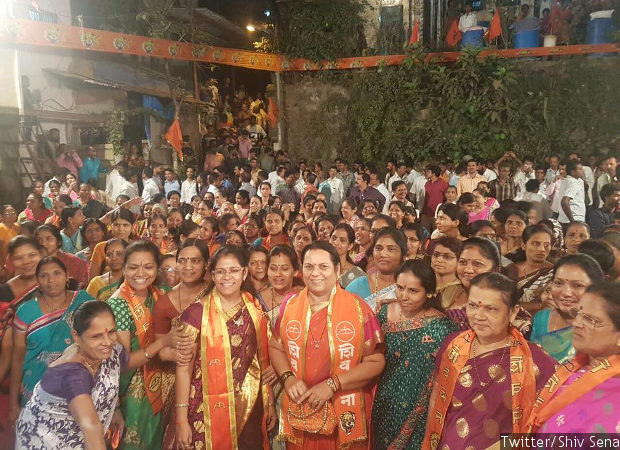Women Better Educated, Less Criminal; Men Ask More Questions In India’s Richest Municipal Corporation
Female leaders of the Shiv Sena campaign, ahead of the elections to the Municipal Corporation of Greater Mumbai (MCGM) to be held today. Shiv Sena’s female corporators attended the largest number of council meetings at the MCGM, and had the third highest average of annual funds spent, analysis of data for the period 2012-16 shows.
India’s richest municipal corporation has more female corporators than men: The women are better educated, younger, and 3.3% have criminal records compared to 31.8% of men--but they ask fewer questions than the men, according to an IndiaSpend analysis of female corporators of the Municipal Corporation of Greater Mumbai (MCGM) as municipal elections are held today.
Our main findings:
- There are 119 female corporators over the current term (2012-17), compared to 110 male corporators.
- Only four female corporators have criminal records, compared to 35 male corporators.
- Women attended 72.5% of MCGM meetings, compared to 73.3% of men who did.
- On average, each female corporator asked 10 questions per year between 2012 and 2016, compared to 13 for each male corporator.
- As many as 34.4% of women are graduates or above, compared to 28.1% of men
We also found that female corporators spent an average of Rs 53 lakh from their constituency funds, primarily on roads, followed by recreation, sewage, water and sanitation. It was not very different for men, who spent an average of Rs 54 lakh on the same areas.
Female corporators from prosperous western wards had the best attendance and asked the most questions.
The Shiv Sena’s women corporators had the best attendance rates at council meetings, while their Nationalist Congress Party (NCP, with eight women) counterparts asked the most questions.
Who attended the most meetings?
Of 119 female corporators in Mumbai, less than 27% have attended more than 85% of MCGM council meetings between 2012 and 2016.
Four of the top five female corporators, by attendance, are from the Shiv Sena, and all of them attended more than 95% of MCGM Council meetings. Nine of the top 10 corporators are from the Shiv Sena.
The top three female corporators, by attendance, are graduates, but there is no correlation evident between education level and attendance. Five of the top 10 female corporators, by attendance, came from Mumbai’s western suburbs.
Source: Praja Foundation, Association for Democratic Reforms, Mumbai Votes
The Shiv Sena had the highest average attendance of 78.5%, followed by the Bharatiya Janata Party (BJP) at 74.09%. Independent candidates performed the worst with an average attendance of 51.4%
Who asked the most questions?
Five of the top 10 female corporators, by questions asked per year, are from the Shiv Sena party.
But on the basis of party-wise average, it is the female corporators from the NCP that have been asking the most questions. This includes Saida Khan, who asked the most questions amongst all female corporators in Mumbai.
The top four female corporators, by questions asked, are graduates, and so are seven of the top 10. In general, better educated female corporators asked more questions, a trend particularly evident in the ward committees--which are entrusted with making suggestions/ proposals about maintaining cleanliness, repair of roads, markets and various municipal buildings amongst other functions--where nine of top 10 female corporators are graduates.
Source: Praja Foundation, Association for Democratic Reforms, Mumbai Votes
Female NCP corporators had the highest average of questions, 19, followed by those of the BJP. Again, the independent candidates had the lowest average: Five.
Most questions raised came from western Mumbai wards, while the L ward (Kurla, Chandivali, Sakinaka)--which had the second lowest Human Development Index amongst all Mumbai wards, according to the city’s Human Development Report in 2009--had three corporators in the top 10, by questions asked. Female corporators from the western suburbs also asked the most questions, as we said.
Who spent the most?
In terms of total municipal funds spent and average annual funds spent during their terms, these are the top five corporators:
Four of the top five spenders refused interviews to discuss their work, as did almost 27% of female corporators that Praja Foundation, an NGO working on governance issues in Mumbai, approached.
Three of the top five spenders came from the Shiv Sena: 50% of the top 10 spenders are from the Shiv Sena, followed by those from the BJP, which accounted for two of the top spenders.
Female corporators from the L ward spent the most money, with 50% of the top ten spenders from this ward.
Most of the corporators spent most money on roads, followed by recreation, improvement in water and sanitation. Housing was given the least importance.
Most corporators who set aside funds for multiple issues were graduates.
Source: Praja Foundation, Association for Democratic Reforms, Mumbai Votes
When it came to average annual funds spent, the Shiv Sena ranked third, after the Samajwadi Party and the NCP. Again, the independent candidates fared the worst.
Only four of 119 female corporators have a criminal record, as we said; a criminal record had had no role to play when it came to participation.
(Salve is an analyst with IndiaSpend. Nair, a graduate in economics and statistics from Mumbai University, is an intern with IndiaSpend.)
We welcome feedback. Please write to respond@indiaspend.org. We reserve the right to edit responses for language and grammar.
__________________________________________________________________
“Liked this story? Indiaspend.org is a non-profit, and we depend on readers like you to drive our public-interest journalism efforts. Donate Rs 500; Rs 1,000, Rs 2,000.”



